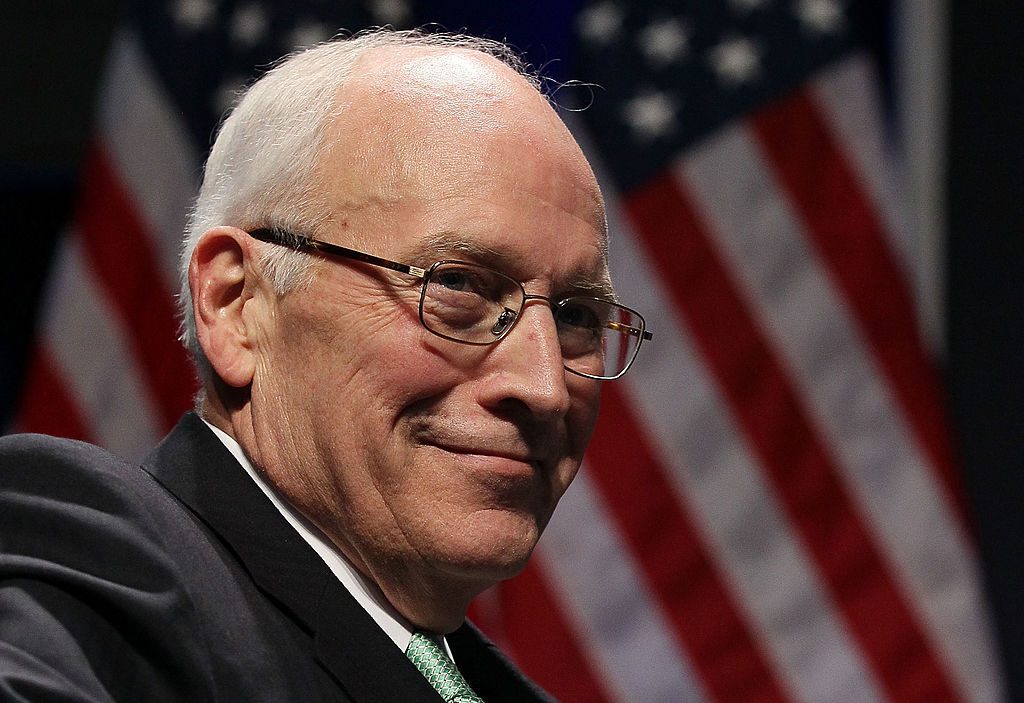It’s hard to imagine American political life without Dick Cheney, who died yesterday at the age of 84. In his posthumous 2014 novel The Last Magazine, the journalist Michael Hastings describes MSNBC’s airing of the then-Vice President’s speech to the military in 2002. The themes scroll across the screen: “VP Cheney: Iraq Has Chemical Weapons. VP Cheney: Iraq Is Pursuing Nuclear Weapons. VP Cheney: We Cannot Allow Iraq to Acquire WMD.” For American Millennials, most in their formative years following 9/11, Cheney’s lines were the daily incantations — really the household background noise of Boomer-fuelled cable news — of that ominous year.
Indeed, it was that summer when Pat Buchanan, the intellectual godfather of Trumpism, launched a co-hosted show on MSNBC, co-founded The American Conservative in opposition to the Bush administration’s foreign policy, and warned that “the halcyon days of George W. Bush may be right now.” Buchanan had worked in the administration of another beleaguered president, Richard Nixon, and was considered too dangerous for the Ford White House. It was a young Dick Cheney, writing in his transition report, who concluded that Buchanan was “too ‘tarred’ with the past”. Both figures came to shape contemporary politics, not least through the foreign-policy conflicts that roiled America’s realigned parties.
“It was in some ways predictable that the central player in the system of willed errors and reversals that is the Bush administration would turn out to be its vice-president, Richard B. Cheney,” wrote Joan Didion for the New York Review of Books in 2006. That year, American voters in places such as Pennsylvania and the post-industrial Midwest punished Republicans in congressional races over the Iraq War. Among those Americans were first-time Millennial voters who by then associated Cheney with the administration’s pursuit of the War on Terror. It was this generation, quaintly hooked on Facebook on their colourful Dell laptops, which two years later embraced the candidacy of Barack Obama, who opposed Iraq and questioned the economic domestic policy decisions — supported by both main parties — that besieged America’s once-dominant manufacturing regions.
This was soon after the late Democratic US Representative John Murtha called for the withdrawal of American troops from Iraq. He represented a region of Pennsylvania long on historical distinction but short on future aspiration. Murtha’s call came just one year after Cheney himself had campaigned in a similar Pennsylvania region at a presidential re-election campaign stop in Hazleton, where he spoke near a statue of Christopher Columbus. In 2004, it was a city of older working-class Italian and Eastern European Democrats still inclined to vote for their ancestral party. Last Election Day, what had become by then a majority-Dominican-American city voted resoundingly for Trump. Those ancestral Democrats did the same.
In a state like Pennsylvania, this MAGA fervour dates to the Iraq War era. “They lied. They said there were weapons of mass destruction. There were none, and they knew there were none,” Trump declared in 2016. His lines remain underrated for their resonance among voters living in towns of disproportionate military service, dramatic demographic change, and bewildering industrial decline.
Last year, Cheney endorsed Kamala Harris for president. His daughter, the former congresswoman Liz Cheney, had campaigned with Harris in suburban Philadelphia — a reliable base of Bush-Cheney Republican voters in the early 2000s. It’s in such regions where the spectre of AI lurks just as the prospect of offshoring lingered in post-industrial towns in the first years of the 21st century. This Election Day, the realignment itself will once again play a factor in outcomes, including a Millennial democratic-socialist New York mayoral candidate who was still a child when Cheney called for the invasion of Iraq. Even now, Cheney’s outsized influence on American life figures in electoral outcomes. There is no Trump era and all its populism — Left or Right — without the late and uniquely powerful former vice president.










Join the discussion
Join like minded readers that support our journalism by becoming a paid subscriber
To join the discussion in the comments, become a paid subscriber.
Join like minded readers that support our journalism, read unlimited articles and enjoy other subscriber-only benefits.
Subscribe